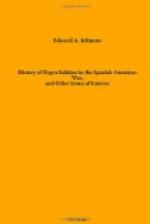It is the duty of a State Governor, when he finds public sentiment dominating the courts and obstructing justice, to interfere, and in case he cannot succeed with the sheriff and posse comitatus, then to invoke National aid. But this step has never yet been taken by any Governor of the States in the interest of Negro citizenship. Some of the State Governors have made some demonstration by way of threats of enforcing the law against those who organize mobs and take the law into their own hands; and some of the mob murderers have been brought to trial, which in most cases, has resulted in an acquittal for the reason that juries have as aforestated, chosen to obey public sentiment, which is not in favor of punishing white men for lynching Negroes, rather than obey the law; and cases against the election laws and for molesting United States officials have to be tried in the district where these offences occur, and the juries being in sympathy with the criminals, usually acquit, or there is a mistrial because they cannot all agree.
THAT MOBOCRACY IS SUPREME in many parts of the Union is no longer a mooted question. It is a fact; and one that forebodes serious consequences, not only to the Negro but to any class of citizens who may happen to come into disfavor with some other class.
[Illustration: CHURCH OF SAN SEBASTIANO, MANILLA.]
WHAT THE NEGRO SHOULD do under such circumstances must be left to the discretion of the individuals concerned. Some advise emigration, but that is impracticable, en masse, unless some suitable place could be found where any considerable number might go, and not fare worse. The colored people will eventually leave those places where they are maltreated, but “whether it is better to suffer the ills we now bear than flee to those we know not of,” is the question. The prevailing sentiment among the masses seems to be to remain for the present, where they are, and through wise action, and appeals to the Court of Enlightened Christian Sentiment, try to disarm the mob. There is no doubt a class of white citizens who regret such occurrences, and




